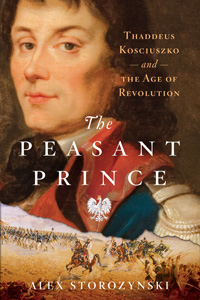Editorial
Front Page - Friday, July 3, 2009
New book honors forgotten son of liberty
David Laprad

With the exception of George Washington, there are more statues in the U.S. of Thaddeus Koscuiszko than any other American historical figure. And every day, thousands of cars cross the Koscuiszko Bridge between Brooklyn and Queens, as well as the Koscuiszko Bridge north of Albany. But who was Koscuiszko?
If you could ask Thomas Jefferson, he’d say, “as pure a son of liberty as I have ever known.” Napoleon Bonaparte would tell you he was “the hero of the North.” Lord Byron would call him “the sound that crashes in the tyrant’s ear!”
Those great men of history actually said those things about Koscuiszko, an engineer and military strategist who lived from 1746 to 1817. In his quest for liberty, Koscuiszko worked with Washington, Jefferson, Benjamin Franklin, Thomas Paine and even the French Revolutionaries as they fought against Catherine the Great and Bonaparte.
Koscuiszko’s extraordinary life has inspired Pulitzer Prize winning journalist Alex Storozynski to write “The Peasant Prince: Thaddeus Koscuiszko and the Age of Revolution.” Available through St. Martin’s Press, it tells the unknown story of Koscuiszko’s heroic pursuit of tolerance.
“Koscuiszko was a prince of tolerance who stood up for black slaves, white peasant serfs, Jews, Native Americans, women and all people who were disenfranchised,” says Storozynski. “He was a man before his time and his story deserves to be taught in schools in America because he offers lessons for us today.”
In “Peasant Prince,” Storozynski writes about how Koscuiszko gave Jefferson $17,000 in exchange for his slaves, whom the engineer intended to set free. Shockingly, Jefferson took the money but refused to carry out the deal. Also, General Horatio Gates tapped Koscuiszko to draw up the war plan for the Battle of Saratoga, the turning point in the American Revolution. And it was Koscuiszko’s plans for West Point that Benedict Arnold tried to sell to the British.
Yet most Americans have never heard of Koscuiszko. Part of the blame for his obscurity lies with the general lack of cultural awareness in this country, Storozynski says, while the rest has to do with his desire to work behind the scenes and his unpronounceable name. “Washington spelled it 11 different ways in correspondence. Once he figured out that the Pole was his best engineer, he made sure to spell it correctly,” says Storozynski.
The author was just as concerned about accuracy, as he spent 10 years researching material for “The Peasant Prince,” traveling as far as Poland, Switzerland and France to delve into Koscuiszko’s life. Storozynski then spent two years writing the book. “I read every book in Polish I could find, and then every letter that was written to and by Koscuiszko. There were also a number of memoirs that I found of people who knew him, and they described what he was like in person,” Storozynski says.
His efforts paid off. The Wall Street Journal called Storozynski’s book “an accessible, soundly researched biography” and praised the writer’s ability to bring a supporting cast that amounts to a “Who’s Who of 18th Century American and European history” to life. Newsweek was no less effusive, calling the tome “a sweeping, colorful and absorbing biography that should restore Koscuiszko to his proper place in history.” Publisher’s Weekly agreed, saying the book’s “minute details” would enthrall readers of military and American history, while the “readable and fact-filled story” would pull casual readers “into the immediacy of the revolution era.”
Storozynski just wants his readers to learn a few things about Polish history. Koscuiszko started a revolt in Poland to try to free the serfs and obtain more rights for peasants, burghers and Jews. To this end, his friend Berek Joselewicz started a Jewish cavalry to fight with Koscuiszko against Russia’s army. As noted on www.peasantprince.com, it was the first wholly Jewish military unit since biblical times.
“I hope readers will learn that Poland was a democracy for centuries and that Polish kings were elected. Poland was a multinational country with a rich democratic tradition, and the Poles had the first written democratic constitution in Europe. This was the tradition in which Koscuiszko was brought up,” says Storozynski.
Byron Price, associate professor at Texas Southern University, offered the best reason to read “The Peasant Prince” when he said the book is “a testament to a great man and an important addition to world history.” Without a doubt, Koscuiszko embodied the best ideas of his time and, as Newsweek said, “experienced some of its worst betrayals and disappointments. “ This alone makes his name one all Americans should know.
To purchase “The Peasant Prince,” visit any online or brick and mortar bookstore. Amazon.com has copies in stock and Rockpoint Books, located on the corner of 4th Avenue and Broad Street in Chattanooga, can have one in your hands in a few days. Call 423-756-2855 to place your order.
|
|